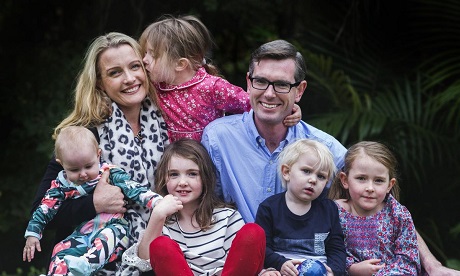Dominic Perrottet (38), NSW’s premier, is a Catholic. Having a Christian faith is part of who he is and inspires him to make a difference wherever he goes, he says.
Described as being a social and economic conservative, Perrottet won a NSW Liberal party room ballot on Tuesday morning. He replaces Gladys Berejiklian and will be the New South Wales’ 46th premier, the youngest in the state’s history.
Perrottet’s views on same-sex marriage, abortion and assisted dying match those of the Catholic Church.
He firmly opposes same-sex marriage, on the grounds that “marriage is about every child’s fundamental right to grow up with their own mum and dad”.
He voted against decriminalising abortion and once told supporters of abortion rights that they were on the “wrong side of history”.
He is likely to vote against the voluntary assisted dying laws that will soon come before the NSW parliament, but says he will allow a conscience vote on any such issues.
“My view has always been in the Liberal Party that when we have certain moral debates in the parliament that they are dealt with, with respect and through a conscience vote, and that’s important.
“It’s important that we have a diversity of views; that’s what makes our parliament great and allows our state to flourish. We should embrace diversity of views and values, not marginalise difference.”
But in recent days, Perrottet’s Catholicism has drawn ever louder and harsher criticism from media.
Critics say he is such a conservative Catholic – he has six children – that he should not lead the state; that his brand of Catholicism is one of “righteousness and self-righteousness around central questions of identity, sexuality, gender politics, minority rights and an unwavering conviction that this is the one true faith”.
Those comments stack oddly against the figure Perrottet has cast for himself: as an advocate for freedom, who expresses his conservative values in public discourse and his voting record in parliament.
He has spoken about how his religious beliefs have had a fundamental influence on his work in politics, including framing his views on issues such as abortion.
“Faith is personal to me, as it is for millions of people across our state, and anybody should be able to put their hand up to serve in public life, and should not be disqualified, based on their faith or their heritage,” he says.
He also says he’s “very passionate about freedom.
“Freedom is the overarching value that I hold and that is that people of different religions, cultural backgrounds have a great place in our society.”
“I certainly believe in diversity. I believe in tolerance. I believe in values of respect for all people. And people should be judged on their actions, not based on an attribute that someone thinks shouldn’t have a place in public life.”
“I believe in freedom, because it is only by exercising freedom that individuals can develop the habits of generosity, hard work, fairness and concern for others,” he said.
“I believe that these habits have made our country great and are ultimately the foundation for the pursuit of the good life. You cannot do good without striving to be good.”
Source
